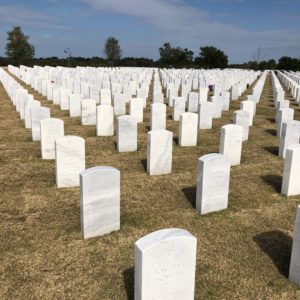
While you may qualify for certain VA veterans burial benefits, they don’t come automatically. Generally, they must be requested in writing well ahead of the time they’re needed. According to a brochure provided by Dignity Memorial, here are some important things you need to know:
- VA benefits don’t cover all of the burial or cremation costs of an honorably discharged veteran. There are certain monetary, recognition, and service benefits that may be available, but reimbursement for funeral or cremation service expenses is limited and generally only applies in very limited circumstances, such as:
- The veteran died because of a service-related disability, or
- The veteran was receiving or was entitled to receive a VA pension or compensation at the time of death, or
- The veteran died while hospitalized by the VA or while receiving care under contract at a non-VA facility.
- You’ll need documentation to verify military service. This is usually a DD-214 (Report of Separation from the Armed Forces of the United States). If you’ve lost your copy, you can request that a copy be mailed to you.
- A veteran’s family must request a United States flag. A flag is provided at no cost to drape the casket or accompany the urn of a deceased veteran. Only one flag per veteran is provided, and it’s generally given to the next of kin. But it has to be requested by submitting VA Form 27-2008 Application for United States Flag for Burial Purposes.
- Military funeral honors ceremonies must be scheduled in advance. The military funeral honors ceremony is performed by two or more uniformed military persons, and includes the folding and presentation of the U.S. flag and the playing of “Taps.” The funeral director requests military funeral honors on behalf of the veteran’s family.
- Veterans’ caskets are NOT free. The only exception is when the veteran died while on active duty.
- A “Presidential Memorial Certificate” must be requested. This is an engraved paper certificate, signed by the current President, to honor the memory of honorably discharged, deceased veterans. Next of kin, or someone acting on their behalf, may apply in person at any VA regional office or by U.S. mail.
- If you choose not to be buried in a VA national cemetery, monetary burial benefits are limited. Basically, the amount of the benefits depends on whether the death was service-related and whether the veteran died in a VA facility or not. For example, if the death was not service-related, the veteran died at Sarasota Memorial, and the family chooses not to bury him or her at a national cemetery, the family may receive $300 toward funeral and burial expenses and a $762 plot interment allowance. To determine the final reimbursement amount, an Application for Burial Benefits (VA Form 21P-530) must be submitted within two years from the date of the veteran’s permanent burial. (Headstones are addressed in a separate bullet point).
- There are eligibility requirements for burial in a VA national cemetery. Generally any member of the Armed Forces who dies while on active duty or any veteran who was discharged under conditions other than dishonorable is entitled to burial in a VA national cemetery. Under certain conditions, the unremarried surviving spouse and minor children are also entitled to this benefit.
- The VA now provides eligibility determinations for interment in a VA national cemetery prior to the time of need through the Pre-Need Determination of Eligibility Program.
- You cannot reserve space in a VA national cemetery ahead of time. So, there’s no guarantee that spouses or other family members will be interred sid-by-side or even nearby.
- Burials in a VA national cemetery are usually NOT conducted on weekends.
- Headstones, markers, or medallions for a burial space in a private cemetery must be requested. The VA, upon request and at no charge to the applicant, will furnish a Government headstone or marker for the grave of any deceased eligible veteran. Niche markers for cremated remains are also available. An Application for Standard Government Headstone or Marker for Installation in a Private or State Veteran’s Cemetery (VA Form 40-1330) must be submitted. Medallions can be requested on another form.
- The issuance or replacement of military service medals, awards, and decorations must be requested in writing. Military service medals, awards, and decorations are available from the National Personnel Records Center (NPRC). Requests must be submitted using Standard Form 180 (SF 180) to the appropriate military service branch division of the NPRC. Generally, there is no charge for medal or award replacements.
Some of these things can be prepared for ahead of time, others cannot. Generally, a funeral, cremation, and burial provider, such as Dignity Memorial, will assist the veteran’s family with much of this.
Other articles you may find interesting:
When There’s No One You Trust to Serve
Alternatives to Probate for Very Small Estates
Ready to make sure everything’s in order for your loved ones in the event you become incapacitated or die? Give Manasota Elder Law a call at 941-444-5958. We’ll help you determine whether you’re all set, or whether there are still some things that need to be done to protect what’s most important to you … your family.








